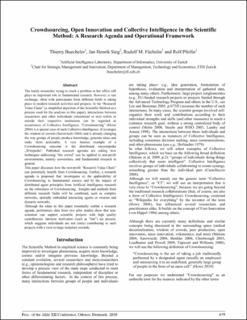Please use this identifier to cite or link to this item:
https://doi.org/10.21256/zhaw-4094| Publication type: | Conference paper |
| Type of review: | Peer review (abstract) |
| Title: | Crowdsourcing, open innovation and collective intelligence in the scientific method : a research agenda and operational framework |
| Authors: | Bücheler, Thierry Sieg, Jan Henrik Füchslin, Rudolf Marcel Pfeifer, Rolf |
| DOI: | 10.21256/zhaw-4094 |
| Proceedings: | Artificial live XII : proceedings of the twelfth international conference on the synthesis and simulation of living systels |
| Editors of the parent work: | Fellermann, Harold Dörr, Mark Hanczyc, Martin M. Ladegaard Laursen, Lone Maurer, Sarah Merkle, Daniel Monnard, Pierre Alain Stoy, Kasper Rasmussen, Steen |
| Page(s): | 679 |
| Pages to: | 686 |
| Conference details: | The 12th International Conference on the Synthesis and Simulation of Living Systems, Odense, Denmark, 19-23 August 2010 |
| Issue Date: | 2010 |
| Series: | Artificial life |
| Series volume: | 12 |
| Publisher / Ed. Institution: | MIT Press |
| Publisher / Ed. Institution: | Cambridge |
| ISBN: | 978-0-262-29075-3 |
| Language: | English |
| Subject (DDC): | 000: Generalities and science |
| Abstract: | The lonely researcher trying to crack a problem in her office still plays an important role in fundamental research. However, a vast exchange, often with participants from different fields is taking place in modern research activities and projects. In the “Research Value Chain” (a simplified depiction of the Scientific Method as a process used for the analyses in this paper), interactions between researchers and other individuals (intentional or not) within or outside their respective institutions can be regarded as occurrences of Collective Intelligence. “Crowdsourcing” (Howe 2006) is a special case of such Collective Intelligence. It leverages the wisdom of crowds (Surowiecki 2004) and is already changing the way groups of people produce knowledge, generate ideas and make them actionable. A very famous example of a Crowdsourcing outcome is the distributed encyclopedia „Wikipedia“. Published research agendas are asking how techniques addressing “the crowd” can be applied to non-profit environments, namely universities, and fundamental research in general. This paper discusses how the non-profit “Research Value Chain” can potentially benefit from Crowdsourcing. Further, a research agenda is proposed that investigates a) the applicability of Crowdsourcing to fundamental science and b) the impact of distributed agent principles from Artificial Intelligence research on the robustness of Crowdsourcing. Insights and methods from different research fields will be combined, such as complex networks, spatially embedded interacting agents or swarms and dynamic networks. Although the ideas in this paper essentially outline a research agenda, preliminary data from two pilot studies show that nonscientists can support scientific projects with high quality contributions. Intrinsic motivators (such as “fun”) are present, which suggests individuals are not (only) contributing to such projects with a view to large monetary rewards. |
| Further description: | Open Access Publikation |
| URI: | https://digitalcollection.zhaw.ch/handle/11475/2725 |
| Fulltext version: | Published version |
| License (according to publishing contract): | CC BY-NC-ND 3.0: Attribution - Non commercial - No derivatives 3.0 Unported |
| Departement: | School of Engineering |
| Organisational Unit: | Institute of Applied Mathematics and Physics (IAMP) |
| Appears in collections: | Publikationen School of Engineering |
Files in This Item:
| File | Description | Size | Format | |
|---|---|---|---|---|
| 2010_Buecheler_Crowdsourcing, open innovation and collective intelligence_Alife Proceedings.pdf | 262.43 kB | Adobe PDF |  View/Open |
Show full item record
Bücheler, T., Sieg, J. H., Füchslin, R. M., & Pfeifer, R. (2010). Crowdsourcing, open innovation and collective intelligence in the scientific method : a research agenda and operational framework [Conference paper]. In H. Fellermann, M. Dörr, M. M. Hanczyc, L. Ladegaard Laursen, S. Maurer, D. Merkle, P. A. Monnard, K. Stoy, & S. Rasmussen (Eds.), Artificial live XII : proceedings of the twelfth international conference on the synthesis and simulation of living systels (pp. 679–686). MIT Press. https://doi.org/10.21256/zhaw-4094
Bücheler, T. et al. (2010) ‘Crowdsourcing, open innovation and collective intelligence in the scientific method : a research agenda and operational framework’, in H. Fellermann et al. (eds) Artificial live XII : proceedings of the twelfth international conference on the synthesis and simulation of living systels. Cambridge: MIT Press, pp. 679–686. Available at: https://doi.org/10.21256/zhaw-4094.
T. Bücheler, J. H. Sieg, R. M. Füchslin, and R. Pfeifer, “Crowdsourcing, open innovation and collective intelligence in the scientific method : a research agenda and operational framework,” in Artificial live XII : proceedings of the twelfth international conference on the synthesis and simulation of living systels, 2010, pp. 679–686. doi: 10.21256/zhaw-4094.
BÜCHELER, Thierry, Jan Henrik SIEG, Rudolf Marcel FÜCHSLIN und Rolf PFEIFER, 2010. Crowdsourcing, open innovation and collective intelligence in the scientific method : a research agenda and operational framework. In: Harold FELLERMANN, Mark DÖRR, Martin M. HANCZYC, Lone LADEGAARD LAURSEN, Sarah MAURER, Daniel MERKLE, Pierre Alain MONNARD, Kasper STOY und Steen RASMUSSEN (Hrsg.), Artificial live XII : proceedings of the twelfth international conference on the synthesis and simulation of living systels. Conference paper. Cambridge: MIT Press. 2010. S. 679–686. ISBN 978-0-262-29075-3
Bücheler, Thierry, Jan Henrik Sieg, Rudolf Marcel Füchslin, and Rolf Pfeifer. 2010. “Crowdsourcing, Open Innovation and Collective Intelligence in the Scientific Method : A Research Agenda and Operational Framework.” Conference paper. In Artificial Live XII : Proceedings of the Twelfth International Conference on the Synthesis and Simulation of Living Systels, edited by Harold Fellermann, Mark Dörr, Martin M. Hanczyc, Lone Ladegaard Laursen, Sarah Maurer, Daniel Merkle, Pierre Alain Monnard, Kasper Stoy, and Steen Rasmussen, 679–86. Cambridge: MIT Press. https://doi.org/10.21256/zhaw-4094.
Bücheler, Thierry, et al. “Crowdsourcing, Open Innovation and Collective Intelligence in the Scientific Method : A Research Agenda and Operational Framework.” Artificial Live XII : Proceedings of the Twelfth International Conference on the Synthesis and Simulation of Living Systels, edited by Harold Fellermann et al., MIT Press, 2010, pp. 679–86, https://doi.org/10.21256/zhaw-4094.
Items in DSpace are protected by copyright, with all rights reserved, unless otherwise indicated.